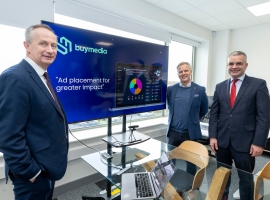
Nearly three in five (58%) Irish businesses face a number of significant barriers in relation to the adoption of technology, despite a willingness to invest. This is according to a report published by Vodafone Ireland working in collaboration with economist, Stephen Kinsella.
The report, which follows a study of 500 SMEs operating in rural and urban areas in Ireland and across a wide range of industries, examines how the sector has adapted to the COVID-19 crisis. Though cost is the highest obstacle (37%), trust in suppliers (36%), integration with older systems (32%), and having the right in-house capabilities (28%), are also common issues for Irish SMEs wanting to invest.
Ireland sits mid-table for the level of digitalisation of its firms versus other European countries – behind Denmark, Croatia, Malta, Latvia and Lithuania. Nearly half (49%) of Latvian firms, for example, are described as having a high use of technology, versus only 31% of Irish firms. According to the report, only 19% of smaller Irish firms are ‘highly digitalised’, while just 24% of larger firms are.
According to a Eurofound study in 2019, just 30% of small firms in Ireland (10-49 employees) report that they sell online. For larger firms (50-249 employees) that number jumps to 38%. This compares to 53% for larger firms in Finland, and in Slovakia, where smaller firms sell more online (42%) than larger firms (39%). Interestingly, however, sentiment in Ireland appears much more certain in relation to economic policy than other markets.
The report also shows that while Ireland experienced large amounts of volatility caused by COVID-19, both Germany and the wider EU experienced a degree more since February 2020. The latest Economic Policy Uncertainty Index shows Ireland at 285, Europe at 327, and Germany at 387, highlighting a strong difference in the levels of uncertainty in Ireland, relative to Germany.
This suggests Ireland was able to communicate policy certainty more adequately than its EU counterparts, due to strong policy supports by the Government. According to the survey, more than 80% of SMEs accessed a Government service during the period and interestingly, 27% felt that the Government was providing enough support.
Vodafone says Ireland has much to learn from small, highly digitalised EU countries like Denmark, Croatia, Malta, Latvia, Lithuania, and Estonia. These countries feature highly digitalised SMEs which use lots of different technologies to build, buy, and sell.
In addition to challenges to the adoption of new technologies, Vodafone warns Irish SMEs require a significant need to upskill employees in the coming years, especially in relation to digital skills. One quarter of SMEs lack confidence in the digital skills of their employees and almost half plan to invest in digital skills training and development. This rises to 65% for larger SMEs.
Commenting on the report, CEO of Vodafone Ireland, Anne O’Leary said, "The tenacity, determination and innovation of Irish SMEs to carry on and to turn uncertainty into opportunity came through strongly in our study. After some big changes to the way we work, many organisations are now doing business safely and successfully and thinking about what comes next. Digitalisation was identified as a key driver for this recovery, with noteworthy growth potential for Irish SMEs who engage in digital transformation."
She added, "However, as has been captured, due to the demographic make-up of Irish SMEs, of which the vast majority are micro-businesses, their ability to make the capital investment required is challenging. Therefore, as the cornerstone of Ireland’s economy and a core driver of post pandemic economic recovery, it is of the utmost importance that financial support and practical policies are in place to allow SMEs invest in digitalisation and compete with EU and global SMEs within the digital economy."
Source: www.businessworld.ie

















